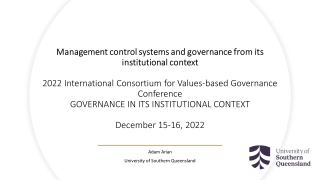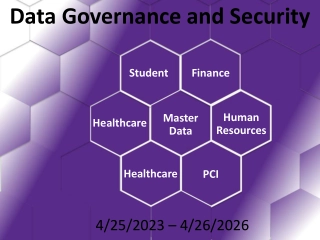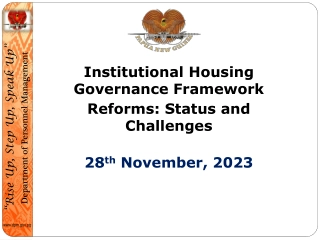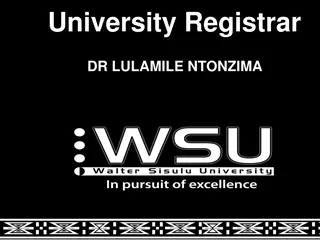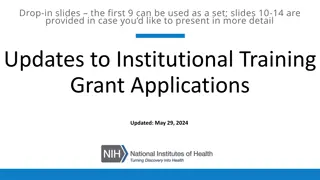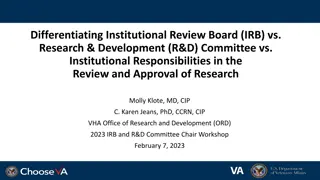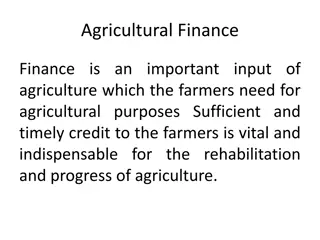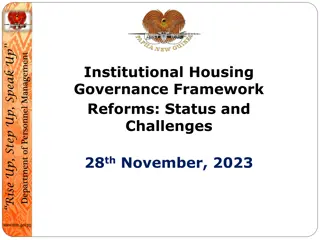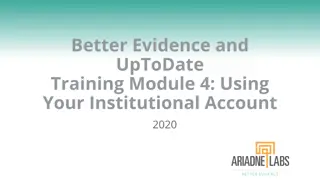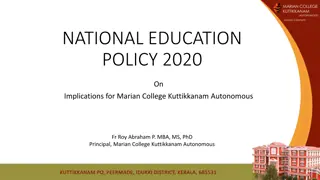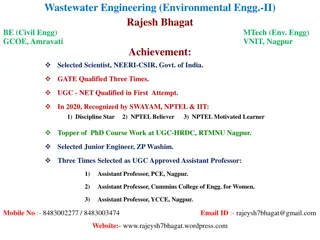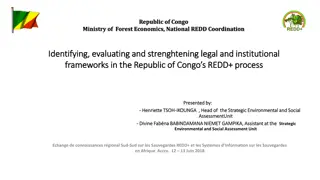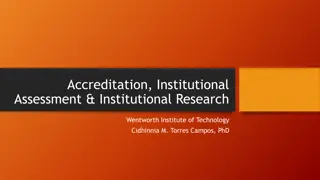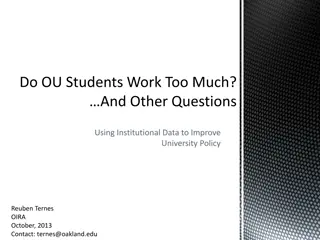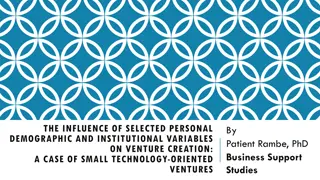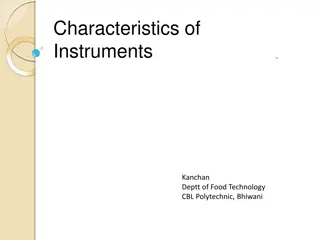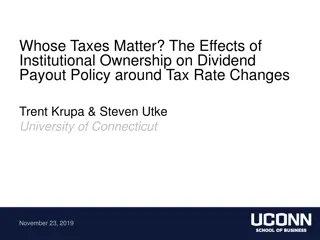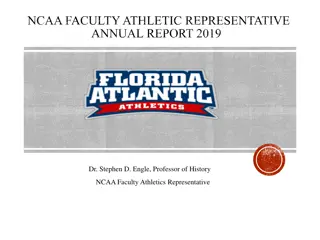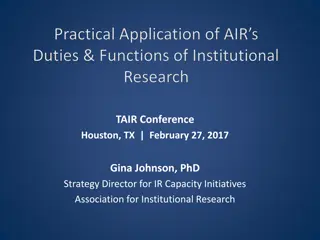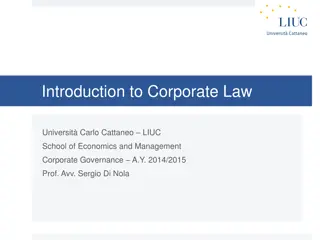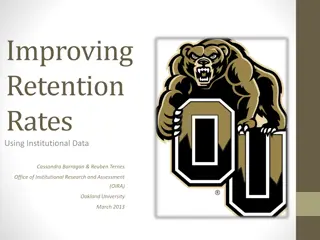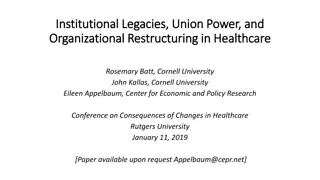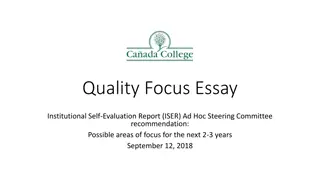Management Control Systems and Governance in the Institutional Context
Explore the role of management control systems (MCSs) and governance structures in the institutional context, focusing on the impact of organizational values, beliefs, and norms. Examine how intangible mechanisms interact with MCSs to improve corporate governance. This topic is particularly relevant
6 views • 10 slides
Understanding Data Governance and Security in Higher Education Institutions
Data governance and security play a critical role in ensuring the effective utilization, quality, and security of institutional data in higher education settings. This involves establishing processes, policies, and standards to support data governance goals such as data security, reliability, standa
4 views • 13 slides
INSTITUTIONAL GOVERNANCE FRAMEWORK
Currently, there is a lack of formal structure in the Institutional Housing Governance Framework (IHGF) within the public service system, leading to inefficiencies in managing institutional housing policies. This absence has resulted in deteriorating state assets, unmet housing demands, and ineffect
0 views • 17 slides
Challenges of Institutional Housing Governance Reforms in the Public Service System
Lack of a formal Institutional Housing Governance Framework in the Public Service System has led to issues in fair distribution of housing for civil servants, impacting their job performance and social welfare. The government's efforts to improve the situation have not yielded the desired results, p
0 views • 10 slides
Presentation to the Portfolio Committee
Overview of the state of governance in the higher education sector, including key roles, institutional statutes, and the composition of councils. Highlights include the regulations under the Higher Education Act and the publication dates of institutional statutes for various universities. Emphasis i
2 views • 83 slides
Enhancing Student Experience in Higher Education through Data-Driven Approaches
Dr. Lulamile Ntonzima, the University Registrar at WSU, brings a wealth of experience in academia and administration. With a focus on optimizing student experience, he emphasizes the pivotal role it plays in academic success and institutional reputation. Leveraging data-driven strategies, Dr. Ntonzi
0 views • 27 slides
Promoting Private Sector Engagement in Local Governance through PPPs in Zambia
This presentation outlines the promotion of private sector engagement in local governance in Zambia through Public-Private Partnerships (PPPs). It covers the legal and institutional frameworks, processes, sub-national level PPP projects, current initiatives, lessons learned, and conclusions. The ove
2 views • 23 slides
Institutional Review Board
The Institutional Review Board (IRB) at AUCA plays a vital role in reviewing and approving research projects involving human subjects to ensure ethical standards are met. This includes obtaining informed consent, protecting privacy, and following international guidelines. Research must contribute to
0 views • 22 slides
Strengthening Institutional Capacity for Nagoya Protocol Implementation in Uganda
Uganda, known for its exceptional biodiversity and diverse indigenous ethnic groups, faces challenges of biodiversity decline and disappearing traditional knowledge associated with genetic resources. The Nagoya Protocol on Access to Genetic Resources and Benefit Sharing (ABS) presents an opportunity
0 views • 17 slides
European Institutional Response to COVID-19: Coordinative Europeanisation and Policy Recommendations
Dr. Stella Ladi from Queen Mary University of London and Panteion University, Athens, presented on the Coordinative Europeanisation during poly-crisis and the EU's institutional response to COVID-19. The presentation highlighted the recovery and resilience facility, the Schengen Area, and the import
0 views • 9 slides
Understanding Institutional Theory and Organizations
Explore the concept of institutional theory, which focuses on the stability and change of institutions and organizations. Learn about institutionalization, deinstitutionalization, and reinstitutionalization, as well as the definitions of institutions and organizations. Discover how institutions like
0 views • 35 slides
Updates to Institutional Training Grant Applications - May 29, 2024
Changes are coming to Institutional Training Grant Applications to reduce burden and support a diverse biomedical research workforce. Updates include key changes to application forms, mentor training expectations, data tables, and peer review criteria. Learn more about the aims and scope of these ch
1 views • 17 slides
Understanding Institutional Review Board (IRB) and Research & Development (R&D) Committee Responsibilities
Explore the distinctions in roles and responsibilities of Institutional Review Boards (IRBs), VA Facility Research and Development Committees (R&D), and VA Facility Institutions in reviewing and approving human subjects research. Delve into key differences and examples of exceeding national policy o
2 views • 31 slides
Overview of Agricultural Finance: Importance, Classification, and Sources
Agricultural finance is crucial for the development of agriculture, providing farmers with the necessary resources for various purposes such as purchasing inputs, managing risks, and improving land. It is classified into short-term, medium-term, and long-term credit based on loan periods, catering t
0 views • 37 slides
Institutional Housing Governance Framework Reforms Status & Challenges
The Department of Personnel Management is addressing the lack of formal governance in institutional housing for civil servants, aiming to improve job performance and welfare by providing proper accommodation. Challenges include inadequate housing, lack of distribution, and poor maintenance. Dr. Bil
0 views • 10 slides
Understanding Reach Characteristics in HEC-HMS Basin Modeling
Reach characteristics play a crucial role in hydrological modeling using HEC-HMS. Georeferenced reaches are essential for computing reach characteristics like slope, sinuosity, relief, and more. The process involves pre-processing drainage data before detailed reach characteristics can be obtained.
0 views • 5 slides
Institutional Support for Entrepreneurship Development in India
The institutional support for entrepreneurship development in India is provided at various levels including Central Government, State Government, Non-Government Support Systems, and District Industries Centers. Key institutions such as the National Board for Micro, Small, and Medium Enterprises (NBM
2 views • 46 slides
Better Evidence and UpToDate Training Module Overview
This module provides detailed insights on utilizing your institutional account for accessing UpToDate resources effectively. It covers topics like global health, institutional subscriptions, CME credit opportunities, and becoming an UpToDate Certified Trainer. Find out how to keep your account activ
2 views • 9 slides
Understanding the Differences and Characteristics of BJT and FET in Electronics
Learn about the disparities between Bipolar Junction Transistors (BJT) and Field-Effect Transistors (FET) in this informative content. Explore the construction, operation, and characteristics of these semiconductor devices, including N-channel JFET specifics, operating behaviors such as pinch-off, d
2 views • 9 slides
Implications of National Education Policy 2020 for Marian College Kuttikkanam Autonomous
The National Education Policy 2020 introduces key changes in the governance of Higher Education Institutions (HEIs), emphasizing research, faculty and institutional autonomy, and restructuring of degree programs. It advocates for institutional consolidation and restructuring, envisioning large, well
0 views • 23 slides
Maximizing Institutional Impact through ACE Centers of Excellence
ACE Impact Centers of Excellence benefit from strong institutional support and are crucial for catalyzing broader teaching and research excellence. The DLI.7 framework outlines various elements that support global best practices in Higher Education, emphasizing the importance of institutional owners
0 views • 17 slides
Understanding Wastewater Engineering: Characteristics, Treatment, and Standards
Wastewater engineering involves studying the characteristics of wastewater, such as its strength and composition, to design effective treatment systems. This field covers topics like conventional sewage treatment plants, types of wastewater based on strength, and effluent standards for disposal. Und
1 views • 54 slides
Exploring Civic Virtue and Institutional Design in Early Modern Governance
Delve into the complexities of civic virtue and institutional design in early modern governance through a 3,000-word essay. Analyze the necessity of civic virtue within the state and consider contrasting perspectives on whether institutional design can replace it. Use primary texts to support your a
0 views • 32 slides
Impact of UN Guidelines on Foster Care and Institutional Care of Young Children in Europe and Central Asia
Professor Kevin Browne and Dr. Shihning Chou conducted a study on the impact of UN guidelines on foster care and institutional care of young children in Europe and Central Asia. The research highlights the physical harm and neural damage caused to children in institutional care without a parent. It
0 views • 11 slides
Strengthening Legal and Institutional Frameworks for REDD+ in Republic of Congo
The Ministry of Forest Economics in the Republic of Congo, along with the National REDD Coordination, is actively identifying, evaluating, and strengthening the legal and institutional frameworks for the REDD+ process. Progress reports highlight the establishment of institutional arrangements, imple
0 views • 10 slides
Institutional Assessment & Research at Wentworth Institute of Technology
Wentworth Institute of Technology excels in accreditation, institutional assessment, and research. The institution's leadership program oversees accreditation efforts to ensure educational effectiveness. They focus on assessing student learning outcomes, measuring educational effectiveness, and cond
0 views • 5 slides
Institutional Assessment and Effectiveness Workshop Achievements at SUNY Oneonta
The Office of Institutional Assessment and Effectiveness at SUNY Oneonta has made significant progress in developing assessment protocols and processes, leading to a culture of assessment. This includes completing planning and assessment cycles, establishing objectives and procedures, and aligning u
2 views • 16 slides
Utilizing Institutional Data to Enhance University Policy: Insights from Oakland University Research
Extracting valuable insights from institutional data, the Office of Institutional Research and Assessment at Oakland University conducts various research activities to improve university policy. Through surveys and internal research, they address important questions like student workload, financial
0 views • 18 slides
Influence of Personal Demographic and Institutional Variables on Venture Creation in Small Technology-Oriented Ventures
This research study explores the impact of personal demographic and institutional factors on venture creation in small technology-oriented ventures. It delves into the influence of individual characteristics like age, gender, education, and social institutions such as family role models on entrepren
0 views • 39 slides
Understanding Characteristics of Instruments in Food Technology
Exploring the static and dynamic characteristics of instruments in the field of Food Technology is crucial for accurate measurements. Static characteristics include stability, range, accuracy, sensitivity, reproducibility, hysteresis, precision, and more. On the other hand, dynamic characteristics f
0 views • 32 slides
Institutional Effectiveness and Assessment at B-CU
Jennifer Dash, Director of Institutional Assessment, and Dorian Hooks, Institutional Assessment Coordinator at B-CU, lead the efforts in understanding institutional effectiveness and assessment. Capacity building, creating a common vision, and a framework for institutional effectiveness are highligh
0 views • 35 slides
Effects of Institutional Ownership on Dividend Payout Policy
This study examines how a firm's ownership structure, particularly institutional ownership, influences its dividend policy around tax rate changes. It explores the impact of tax-sensitive/insensitive institutional ownership, the role of dedicated institutions as monitors, and the interaction between
1 views • 26 slides
NCAA Faculty Athletics Representative Annual Report 2019
Dr. Stephen D. Engle, a Professor of History, serves as the NCAA Faculty Athletics Representative (FAR) and Chair of the Inter-Collegiate Athletic Committee. The report outlines the general responsibilities of the FAR, including overseeing sub-committees on Academic Performance, Institutional Contro
1 views • 13 slides
Role and Functions of Institutional Research in Higher Education
This content discusses the importance of developing duties and functions for Institutional Research (IR) professionals in higher education institutions. It highlights the key responsibilities of IR, such as identifying information needs, collecting and analyzing data, serving as data stewards, and e
0 views • 21 slides
Opportunities to Mobilize Institutional Investment in Capital Markets
Aligning trillions of dollars managed by OECD institutional investors towards green infrastructure investments presents a significant opportunity. Currently, only a small percentage of large pension fund assets are directed towards infrastructure, with an even smaller fraction allocated to green pro
0 views • 4 slides
Understanding the Core Structural Characteristics of a Business Corporation
The common structure of business corporations involves five key characteristics: legal personality, limited liability, transferable shares, delegated management under a board structure, and investor ownership. These characteristics are present in economically significant jurisdictions and cater to t
0 views • 35 slides
Promoting Student Success at Clayton State University
The role of the president in driving student success at any institution is crucial. This involves actively supporting students, staff, and institutional efforts, as well as addressing challenges and embracing a culture of progress. Data on institutional characteristics, such as average age, full-tim
0 views • 42 slides
Enhancing Student Retention Rates through Institutional Data Analysis
Explore how Oakland University's Office of Institutional Research and Assessment leverages various data sources, policy analysis, and predictive modeling to improve student success and retention. Discover the role of IR offices, available resources, survey data, and the importance of collaboration f
0 views • 33 slides
Examining Union Power and Institutional Legacies in Healthcare Organizational Restructuring
Challenges faced by healthcare unions due to institutional legacies and shifts in the healthcare system are explored. The study delves into the variation in union success, emphasizing local institutional contexts in the U.S. and power dynamics between employers and unions rooted in historical contin
0 views • 16 slides
Institutional Self-Evaluation Report: Quality Focus Areas for Future Growth
The Institutional Self-Evaluation Report recommends key focus areas for the next 2-3 years to enhance student learning and achievement. Projects include addressing barriers to entry, streamlining processes, enhancing student support programs, and improving institutional effectiveness through plannin
0 views • 5 slides
